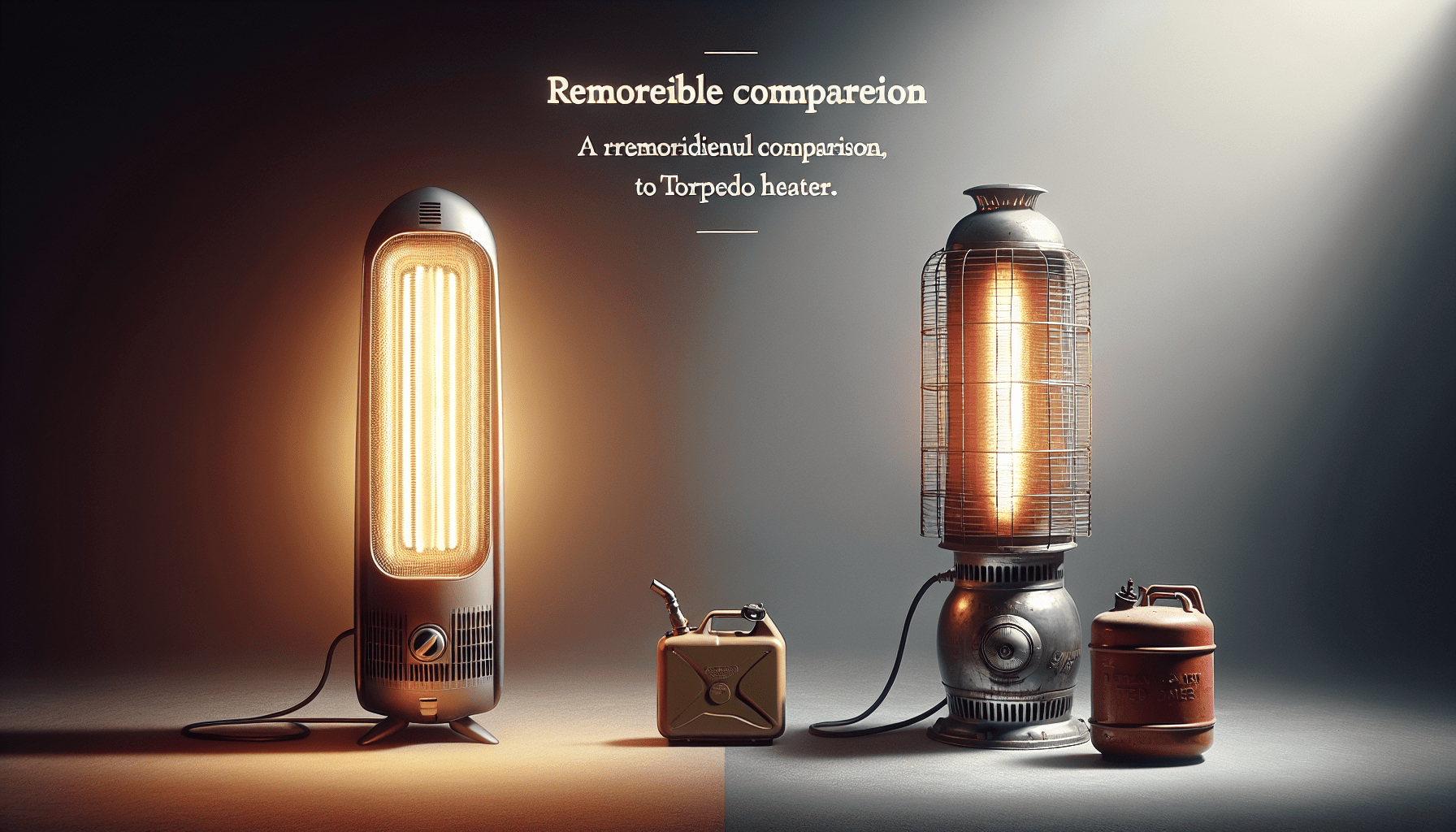Have you ever found yourself shivering in your own garage, wishing for a reliable source of heat? When the temperature drops, it’s easy to start considering your options for warming things up. Among the most popular solutions are electric and fuel-powered torpedo heaters. But which one is right for you? Let’s unpack these two heating options and help you find the best fit for your unique needs.

Understanding Torpedo Heaters
Torpedo heaters are portable heating devices that generate significant heat for both indoor and outdoor environments. They get their name from their long, cylindrical shape, resembling a torpedo. They are designed to provide warmth quickly, making them perfect for construction sites, garages, and warehouses.
How Do They Work?
Electric torpedo heaters draw power from electrical outlets, converting electricity into heat. These heaters often use a fan to move warm air and distribute it throughout the area. On the other hand, fuel-powered torpedo heaters operate by burning fuel—like kerosene, propane, or diesel—to create heat. They tend to be more robust and can create substantial warmth.
Both types come with their advantages and limitations, which we’ll examine in more detail.
Electric Torpedo Heaters
Electric torpedo heaters have grown in popularity due to their convenience and ease of use. You simply plug them in, and they’re ready to go!
Advantages of Electric Torpedo Heaters
-
Ease of Operation: Electric heaters are typically easier to operate. Plug them in, turn them on, and you’re good to go! They often come with adjustable settings for your comfort.
-
Maintenance-Free: These heaters usually require less maintenance than their fuel-powered counterparts. There’s no need to worry about changing filters or cleaning out fuel lines.
-
Quiet Operation: Many electric models operate quite quietly, making them suitable for environments where noise could be an issue.
-
Safety Features: Electric models often come with built-in safety features, such as tip-over switches and overheat protection, which can provide peace of mind.
Disadvantages of Electric Torpedo Heaters
-
Power Source Dependency: They require an electrical outlet, which may limit where you can use them. If you’re working in a remote location without power, this could present a challenge.
-
Heating Capacity: While they can warm up an area quickly, they may not be as effective for very large spaces, especially in extreme cold conditions.
-
Cost of Electricity: Depending on your location, the costs associated with running electric heaters may be higher than anticipated, particularly with heavy usage.

Fuel-Powered Torpedo Heaters
If you’re looking for serious power, fuel-powered torpedo heaters might be the way to go. These heaters can create a substantial amount of heat and are often favored in industrial settings.
Advantages of Fuel-Powered Torpedo Heaters
-
High Heating Capacity: They are designed to heat larger spaces quickly, making them ideal for industrial environments or vast outdoor areas.
-
Portability: Since they don’t require a plug, you can use them anywhere as long as you have fuel. This can be particularly advantageous for job sites or remote areas.
-
Longevity: Some fuel-powered units can run for hours without needing a refill, allowing for continuous operation.
-
Variety in Fuel Options: Different fuel types mean you can choose one that’s readily available to you. Whether it’s kerosene, propane, or diesel, you’ll have flexibility.
Disadvantages of Fuel-Powered Torpedo Heaters
-
Maintenance Needs: These heaters require more regular maintenance, including fuel storage and occasional filter cleaning, to ensure optimal function.
-
Noise Level: Generally, fuel-powered heaters can be much noisier due to their combustion process, which may be disruptive in quieter environments.
-
Emissions: Burning fuel produces emissions, which can lead to air quality concerns, especially in enclosed spaces. Ensuring proper ventilation is crucial.
-
Safety Risks: With fire-related heating weapons, there are inherent risks such as fire hazards and the possibility of fuel leaks.
Key Considerations When Choosing a Heater
Now that you have a clearer understanding of both types of heaters, it’s essential to consider a few factors before making your decision.
Space Size
Consider the size of the area you need to heat. If you’re dealing with a small garage or workshop, an electric heater may suffice. However, for larger spaces or outdoor use, a fuel-powered heater could be the better option.
Frequency of Use
How often will you be using the heater, and for how long? If it’s a one-off situation, an electric heater might serve you well. For more prolonged and regular heating, the efficiency of a fuel-powered model can prove beneficial.
Operating Environment
Think about where you’ll be using your heater. A well-ventilated outdoor space is ideal for fuel-powered heaters. If you’re in a confined area, consider how much ventilation is available, as fuel heaters can contribute to air quality issues.
Budget
Assess your budget not just for the initial purchase but also for ongoing operational costs. Electric heaters may have lower initial costs, but electricity expenses can add up. Conversely, while fuel heaters might require a higher upfront investment, they could ultimately be more economical depending on usage.
Safety and Regulations
Understand local regulations regarding combustion heaters and make sure to use them according to safety guidelines. This includes considerations for CO2 emissions and proper fuel storage.
Conclusion: Making the Right Choice
Choosing between electric and fuel-powered torpedo heaters doesn’t have to be overwhelming. You’ll find that both options come with their unique benefits and challenges.
Reflecting on your specific needs—whether that’s the convenience of electric heating or the high-output performance of fuel-powered units—can help guide your choice. Both options have their merits and can provide warmth, comfort, and safety during chilly times.
Ultimately, your decision boils down to what aligns best with your situation and preferences. Ensure to evaluate your needs comprehensively, and soon enough, you’ll be warming yourself in your garage like it’s summertime.
Feel free to heat things up and turn that icy space into a cozy haven. Just remember to keep safety in mind and choose the heater that compliments both your lifestyle and environment. Happy heating!

